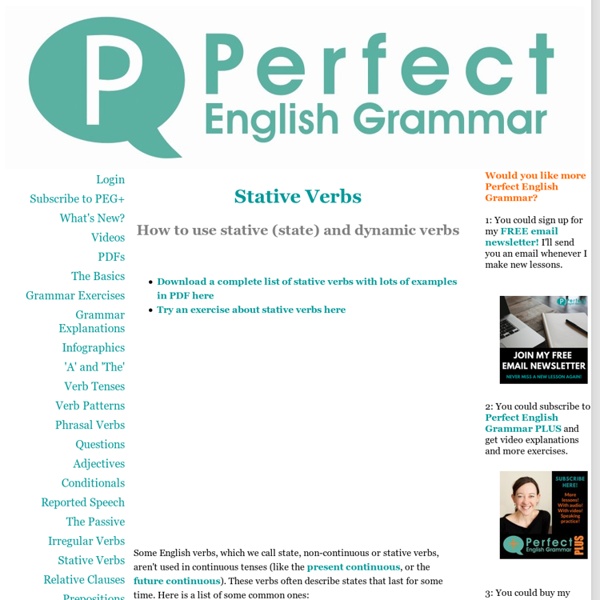English Language Centre Study Zone: Welcome!
About the Study Zone The Study Zone is for students of the English Language Centre (ELC) at the University of Victoria. ELC teachers create the English language lessons and practice exercises. The site is designed for our adult English language learners, but all are welcome to read the lessons and use the exercises. News and Feedback We occasionally post news on the Study Zone blog and we're happy to receive comments on the blog's Feedback Page. Who visits Study Zone? This map shows the visitors to this page only. What do I do? First, choose your level. Study Zone is made up of levels. Where am I now? The menu at the top of each page tells you where you are.
BBC World Service | Learning English | Ask about English
English grammar: A complete guide
Do you have a question about the correct usage of the semi-colon or how to place relative adverbs in a sentence? If so, you've come to the right place! The edufind.com English grammar guide is a complete reference on the rules of English usage. Every grammatical rule is explained in clear, simple language with several examples and, when necessary, counter-examples. Comparisons Conditional Future Gerund and Present Participle Infinitive Passive Voice Past Present Functions and classes of determiners Articles Quantifiers Distributives
BBC World Service | Learning English | The Flatmates - Language Point 4
BBC World Service | Learning English | Ask about English
Stative and Dynamic Verbs 1
Decide whether each verb is normally stative or dynamic. Click on the button beside the correct answer. want stative dynamicbelieve stative dynamicpaint stative dynamicunderstand stative dynamicsmell (for example "This fish smells funny.") stative dynamicremember stative dynamicseem stative dynamicread stative dynamicchange stative dynamicjump stative dynamic
Everyday Grammar: Stative Verbs
Accessibility links Languages VOA Learning English PreviousNext Breaking News Live Everyday Grammar TV Everyday Grammar: Stative Verbs Embed The code has been copied to your clipboard. The URL has been copied to your clipboard No media source currently available Direct link Your opinion This forum has been closed. All comments (9) ashraf aboulgheit 07/21/2017 4:08 PMit's really good and useful ,thank you Mohammed shameer 07/10/2017 5:41 PMOne of the my friend earlier elected party president by unanimously therefore I have to need sending best quote for him please help me how to sending good massage to him ? Related Episodes See all episodes See TV Programs See Radio Programs Back to top
State verbs and action verbs
State verbs State verbs express states or conditions which are relatively static. They include verbs of perception, cognition, the senses, emotion and state of being: State verbs are not normally used in continuous forms: I am needing a new phone. Action verbs Action verbs (also called dynamic verbs) express activities, processes, momentary actions or physical conditions: They may be used in continuous forms: Who was he dancing with? State verbs in the continuous form Some state verbs may be used in the continuous form if they refer to a temporary action or an action in progress at a certain moment, rather than a permanent attitude: I'm having second thoughts about moving abroad. There are also state verbs which may be used in the continuous form, but with a different, active meaning: Naturally, we can use the verbs with the active meaning in the simple form, too: How often do you see your dentist? But we cannot use the verbs with the stative meaning in the continuous form:
Useful English: Ex. 4: Stative Verbs
Useful English Ex. 4: Stative Verbs Stative verb or action verb? 1. He often helps other people. 2. I have been thinking about this project since last spring. 3. Can you help me, please? 4. Is that Alan over there? 5. She was tasting the soup in the kitchen when the telephone rang. 6. This soup tastes good. 7. Could you call a little later? 8. She has known him for quite a long time. 9. Your bag weighs a ton. 10. I see a little boy in the room. Your result: 00% correct.
Stative verbs
Stative verbs Some verbs are not usually used in the continuous form, even when we are talking about temporary situations or states. These are called stative verbs. So, we say I’m sorry, I don’t understand rather than I’m not understanding. 1. She doesn’t know what to do NOT She isn’t knowing what to do Do you agree with me? Other verbs in this group include: believe, doubt, guess, imagine, mean, remember, think 2. I like this song. Other stative verbs in this group include: dislike, love, prefer. want, wish NB – although ‘enjoy’ is a verb of emotion, it is used in the continuous tense I’m enjoying the party. 3. These verbs aren’t usually used in continuous forms. It smells of smoke in here. 4. Look carefully at these 2 sentences. He smells of fish. The second sentence is an action – not a state. I think we should go to Croatia for our holiday this year. The first sentence is an opinion but the second sentence is an action.



